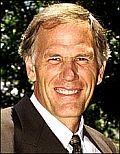We asked a number of leaders in sustainable food and agriculture to imagine they found themselves in an elevator with the president-elect — giving them one minute of his undivided attention. Here are their messages to Obama about how he should approach environment, energy, climate, and food policy. (For more perspectives, check out Part 1, Part 3, and Part 4 of our elevator-pitch series.)
—–

Anna Lappé, author and co-founder of the Small Planet Institute:
"President Obama, you have inspired millions by your call to all of us to become part of the change we want to see in the world. In your speeches, and in the very design of your campaign, you’ve asked us to commit to something greater and bigger than ourselves. After 9/11, we were told to shop. You have called us to act.
"One powerful way you could call upon young people across the country to engage in meaningful change would be to create a Food Corps, modeled after the Peace Corps, that would inspire and support a generation of young people to dedicate a year or two of their lives to engage with ending needless hunger in a country of plenty and the squandering of fossil fuels, water, soil, and other precious resources through chemical agriculture.
"A Food Corps would support young people spreading out into the country to spend time on farms, to teach children in school gardens, to work with emergency food service providers, to engage with food policy councils to transform local, state, and federal policies to support healthy, sustainable foods.
"A Food Corps would, as Wendell Berry would say, solve for pattern: At once, you would generate a compelling call for service and at the same time directly address one of the most painful legacies of previous administrations: 36 million Americans who are food insecure. At that same time, you’d be supporting the flourishing of sustainable, people-dependent, fossil-fuel independent farms and gardens that would be well suited to withstand the coming climate chaos. These organic, sustainable farms, we now know, will also play a vital part in climate-change solutions, because they decrease dependence on fossil fuels and sequester carbon in their soils.
"By creating a Food Corps, you’d be sending a signal to the rest of the world that the United States will no longer be known as the subsidizer of commodities that we dump to the decimation of local food systems globally, but that our country joins together with many others around the world who have embraced the idea that access to healthy food is a basic right of every citizen. May it be so in the new United States of America."
—–

Eric Schlosser, author of Fast Food Nation:
"Mr. President, you ran one of the most dignified and inspiring campaigns in American history. Bravo. And by the way, how about appointing Robert F. Kennedy, Jr., to run the EPA? And, you know, Wendell Berry would make a great Secretary of Agriculture …"
—–

Anya Fernald, executive director of Slow Food Nation:
"You speak often about how America’s greatest asset is how open and ready Americans are to change, and how creative we as a people are at solving problems through ingenuity and grit. We saw that adaptability and willingness to change in the support your campaign received, and we’ll need to use that same asset if we’re going to make it through the upcoming recession. One area that needs change — and needs it fast — is our food system. The problems caused by the current food system are grave. The way America produces and consumes food is making us physically sick, it’s hurting the environment, and it’s breaking down our rural and urban communities. But changing it could be as simple as inspiring and supporting a rapid and entrepreneurial shift toward a different food system, with the core values of healthy communities, healthy people, and a renewed infrastructure that provides access to affordable, nutritious food for everyone. Inspire that change: fund it, speak about it, and prioritize it in your administration’s legislation, funding, and foreign policy. The benefits will be both immediate and long term, and will support broad, positive shift in individual health, environmental sustainability, quality of life, and economic viability of America’s cities, towns, and rural areas."
—–

Hank Herrera, project manager for HOPE Collaborative Health for Oakland’s People and Environment:
"I would not say anything to the president-elect about energy and climate because these issues pale in comparison to his achievement in beginning to heal the horror of racism and oppression that has plagued this country and the world for millennia."
—–

Ann Cooper, director of nutrion services for the Berkeley Unified School District and author of Lunch Lessons; and Kate Adamick, food-systems consultant and director of The Orfalea Fund’s s’Cool Food Initiative:
"Mr. President, our children are America’s most important resource, and food is the most important health, social justice, and national security issue facing them today. Our children deserve to be not just well-fed, but fed well. One way to ensure this is to serve every school child, regardless of income, a cooked-from-scratch meal made with local, sustainable whole foods each day.
This will require:
- Increasing the federal reimbursement rate under the National School Lunch Act by at least $1.00 per child per day, and requiring that the additional funds be spent on fresh produce, whole grains, and sustainably raised meat and dairy products rather than on processed "foods";
- Investing in upgrading school kitchen infrastructure to provide cafeteria workers with the equipment they need to properly perform their jobs;
- Investing in culinary training to teach cafeteria workers the lost art of cooking meals from scratch, perhaps by following Michael Pollan’s suggestion of forgiving student loans for culinary school graduates who agree to spend two years working in school kitchens;
- Raising the nutritional guidelines so that at least 80 percent of the products used in school meal preparation are fresh, whole, sustainably-grown foods, with an emphasis on fresh fruits and vegetables; and
- Mandating cooking and gardening classes so that children have hands-on experiential learning opportunities in food-related environments so that they learn to appreciate the intrinsic connections between food, health, and the environment.

"With the CDC predicting that one-third of Caucasian and one-half of African American and Hispanic children are facing the likelihood of acquiring Type II Diabetes, we cannot afford to ignore this issue any longer. We must make our children’s health a national priority. Please, sir, for the sake of our children and our future, say ‘Yes we can.’"
—–
Sam Fromartz, editor of ChewsWise and author of Organic, Inc.:
"Mr. President, the failure of the last eight years has stemmed from two things — an unbridled free market where the government should have intervened and setting the wrong kind of incentives where the government did intervene. That caused industry, finance, and agriculture to bring us down, not build us up. It’s now time to create markets that can work for the social good by getting rid of ethanol welfare and cutting farm subsidies, and by setting carbon caps or taxes. We also need to put money toward green jobs and promote greener agriculture so that we can begin to deal with global warming and recession, and put good food on people’s plates. Do that and you’ll have a lot of people at the table ready to dig in."
—–

Bob Scowcroft, executive director of the Organic Farming Research Foundation:
"Mr. President, wow, good morning. Ah, er — well, if I may be so presumptuous — what did you have for breakfast this morning? For many, this is the only question that matters. As our president, we expect you to address global warming, particularly as it relates to hunger, as it is among the most pressing issues of our time. Renewable energy, emerging technologies, new efficiency standards, soil conservation, and a shift toward organic farming research will all play roles in creating our green future. Developing a new set of research priorities will be the realm of policy wonks and visionaries. We will support you. It will take time. However, we can move so much faster if we look to our family farmers for solutions. Imagine school lunch programs buying direct from organic farmers. What if cities established production alliances with surrounding producers nearby? Let’s challenge the USDA to recognize organic family farmers as the most precious of our natural resources. Mr. President, if you could name just one organic family farmer who grew just one item at every meal you consumed, the nation would follow. So, are you thinking about dinner yet?"
—–

Bonnie Azab Powell, editor of Ethicurean.com and Edible San Francisco magazine:
"You said you read Michael Pollan’s New York Times Magazine essay on how you could reform food policy if elected — that’s about the best blueprint you could follow. To its many recommendations, I’d add these:
- Start a Farm for America job corps program, like Teach for America, for people who want to learn how to farm, with apprenticeship match-ups, salary support, and low-interest loans. Find unused federal land that could be farmed by the program and the fresh, edible proceeds donated to area schools and food banks. This would double as an excellent economic stimulus package a lá the Works Progress Administration.
- Appoint a Secretary of Agriculture who does not represent Big Food or Big Farma. Iowa organic farmer and activist Denise O’Brien, who narrowly missed being elected that state’s Ag Sec, would be an excellent pick.
- Consider revamping how the USDA is structured: The agency in charge of regulating agriculture should not also be in charge of promoting its economic interests. And while you’re at it, perhaps institute a groundbreaking "no revolving door" policy at the USDA, FDA, and EPA: high-ranking officials cannot have held executive positions at the corporations they will be regulating and are banned from going to work for them for, say, three years after they finish serving in the government.
- Educate yourself more thoroughly about ethanol and other biofuels: federal support and subsidies for them have extremely detrimental trickle-down effects."
—–
Gordon Jenkins, director of Eat-Ins.org and content coordinator for Slow Food Nation:
"You’ve already read Pollan’s article, so you know that you can’t deal with our climate, energy, and healthcare crises without addressing food and agriculture. The generation of young people that’s inheriting the food system is ready for green jobs in sustainable food production. Create policy and invest in programs to incubate new farmers and train us to grow and share food that is good for us, good for the planet, and good for our communities. We will follow your lead."
—–

Hope Shand, research director for the ETC Group:
"Mr. President-elect, congratulations. I’m ecstatic that change has come to America. Industrial biofuels may be popular in big farm states, but they have been a tragic boondoggle that can’t be remotely described as a socially or environmentally sustainable response to climate change. Industrial agrofuels are driving many of the world’s poorest farmers off their land, and they’ve been the single greatest factor contributing to soaring food prices — pushing millions of people in the global South from subsistence to hunger. Instead of dismantling perverse biofuel subsidies, our current energy policy dictates that by 2022, 44 percent of our biofuels must come from so-called "next generation" non-edible cellulosic feedstocks — all of it made possible by advanced biotechnologies that don’t yet exist.
"Some of your advisors will point to synthetic biology — the creation of designer organisms built from synthetic DNA — as the newest techno-fix. Many of the world’s largest agribusiness and energy corporations are investing in engineered microbes ("living chemical factories") fueled by plant-derived sugars to produce transportation fuels, chemicals, textiles, drugs, and more. It may sound clean and green, but massive demand for agricultural feedstocks will deplete soil and water, destroy biodiversity, and devastate marginalized farm communities. Synthetic biology is moving full speed ahead with little debate about who will control the technology, how it will be regulated, and despite grave concerns surrounding the safety and security risks of designer organisms.
"It’s time to resurrect the federal Office of Technology Assessment and get serious about steps to ensure public participation and transparency in how our government makes decisions about public funding for new technologies. Let’s take a cue from European states and adopt policies that rely on a precautionary approach to high-tech, high-risk science and technology."
—–

Timothy LaSalle, CEO of the Rodale Institute:
"One inexpensive technology that is available today to clean up our waterways, build soil instead of lose it, produce healthier food for all citizens (thereby reducing healthcare costs), and reduce CO2 levels in the atmosphere by 40 percent — the largest single tool to fight global warming — is to simply pay all farmers for carbon, not corn. And it will mean we will just have to reduce our dependence on foreign oil, because this technology is organic, regenerative agriculture."
—–

Zoe Bradbury, Oregon coast farmer and Kellogg Foundation Food and Society Policy Fellow:
"It’s an incredible thing to have a president who recognizes the importance of sustainable agriculture and regional food systems — and most of all, a president who acknowledges the need to proactively foster a new generation of young farmers in America. Thank you for being that president, Mr. Obama. Your leadership on this front is going to be critical to the food security — and the national security — of this country in the coming years.
"We need you to cultivate an energized cadre of young farmers in this country — farmers who can put healthy, green, fair, clean food on the plates of every American. Farmers who can wean U.S. agriculture off of its oil addiction. Farmers who can steward land with the next seven generations in mind.
"We’re at a critical point: Farmers make up a scant 1 percent of the U.S. population, and at 55, the average American farmer is older than ever before. This at the same time that America’s young farmers are scarcer than any time in history. Remember, the equation is frighteningly simple: no farmers, no food.
"We need you to go to bat for young farmers so that we, in turn, can feed this country well. We need affordable, accessible farmland. We need equitable access to credit. We need vibrant, fair, stable markets. We need technical assistance and agricultural training programs. And at very core of it all, we need to restore honor to one of the world’s oldest, most essential professions.
"Your dinner depends on it."
—–
Roni Neff, research director for the Center for a Livable Future:
"Climate change is a top threat to public health, justice, and wellbeing. Missing from most lists of climate responses is food. Nearly one-third of global greenhouse-gas emissions come from current agriculture and forestry practices.
As you develop your climate agenda, here’s some low-hanging fruit:
- Address hidden subsidies for meat and communicate an "eat less red meat" message.
- Promote climate-friendly food production, labeling, access, and affordability.
- Reevaluate the ethanol mandate.
- Support good management that enables soil, forests, and plants to store vast quantities of carbon.
- Support research and programs on agriculture for a climate-impacted future.
- Establish a Food Agency to address these and other food-system challenges.
"The American people have given you a mandate to lead boldly. We are full of hope as you set the table for action."


